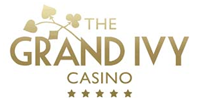Atlantic City
Atlantic City was recognised as a potential tourist destination back in the 1850s. Dr Jonathan Pitney, the man considered to be the father of Atlantic City, was a physician and South Jersey native who believed that the area was an ideal spot for a resort or as he called it, a “medical retreat”.
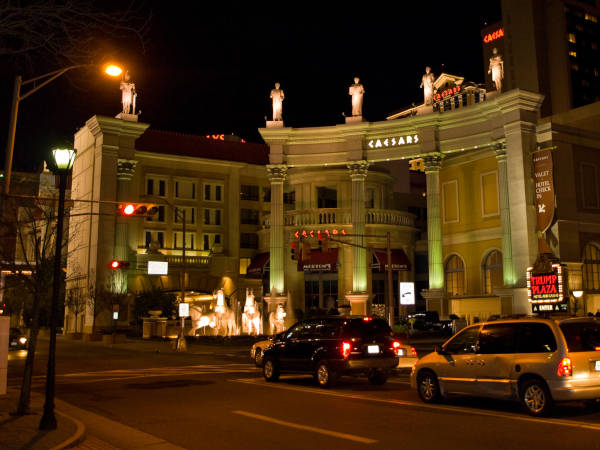
Pitney proposed the idea of a resort town to Philadelphia railroad executives who agreed and built tracks between Absecon Island, the island Atlantic City is located on, and Philadelphia. The Camden and Atlantic Railroad finished construction in late June 1854 and a regular passenger service launched on July 4.
Over the next two decades, Atlantic City became a resort destination. Many people travelled to Absecon Island for medical treatment and as the number of visitors increased so did the number of hotels.
More and more were constructed, including The United States Hotel which was famous for being the largest hotel in the US for several decades.
Around this time, hotel owners decided to build the city’s first boardwalk to keep sand out of their buildings. The boardwalk continued to grow over the following decades to what we know it as today and while more people were visiting Atlantic City than ever before at the end of the 19th century, it wasn’t until Enoch ‘Nucky’ Johnson took over the city that it reached its golden age.
Enoch ‘Nucky’ Johnson
Enoch ‘Nucky’ Lewis Johnson was the man who changed Atlantic City and launched the city into its golden age. Born on January 20, 1883, Johnson was the son of Smith E. Johnson, an elected Sheriff of Atlantic County. Smith then became Sheriff of New Jersey and then of Mays Landing when the Johnson family relocated there.
At the age of 19, Enoch decided to follow in his father’s footsteps. He became the undersheriff of Mays Landing before he was elected Sheriff of Atlantic County in 1908. Shortly after, Johnson was given the position of Atlantic City Republican Executive Committee Secretary and took over the organisation when his boss Louis Kuehnle was imprisoned for corruption.
Despite never running for an elected political office, Johnson’s money and influence made him one of the most powerful men in Atlantic City. His power only grew when he took on a position as the county’s treasurer, giving him access to the city’s funds. During this time, Johnson grew Atlantic City’s tourism industry by promoting prostitution and allowing the service of alcohol on Sundays.
When prohibition, a law that banned alcohol, kicked in, the famous city only became more popular.
The Prohibition Era
The federal prohibition on alcohol came into effect in 1920, but Atlantic City famously ignored prohibition. This led the city to become even more popular, earning the nickname “The World’s Playground”. During the prohibition, Johnson made sure that anyone who was serving alcohol or running a brothel or gambling den wasn’t bothered as long as he got a cut of the money.
It’s estimated that Johnson’s income exceeded $500,000 a year (Around $7 million today) during this time and reports suggest that most of his income came from the percentage he took on every gallon of illegal alcohol sold and on gambling and prostitution rings throughout the city.
Johnson was a man with expensive taste. According to reports, he rode in a chauffeur-driven $14,000 blue limousine, wore expensive clothing including a $1,200 racoon coat and always wore a fresh, red carnation on his lapel. At the height of his power during the prohibition era, Johnson lived in a suite on the ninth floor of the Ritz-Carlton Hotel on the Atlantic City boardwalk. Because of this, he was both known as “the Czar of the Ritz” and “the Prisoner of the Ritz”.
With his insane wealth, Johnson gave to those in need and was loved by the citizens of Atlantic City. He also wasn’t afraid about speaking publicly on the city’s vices and was quoted as saying:
“We have whiskey, wine, women, song and slot machines. I won’t deny it and I won’t apologise for it. If the majority of the people didn’t want them they wouldn’t be profitable and they would not exist. The fact that they do exist proves to me that the people want them.”
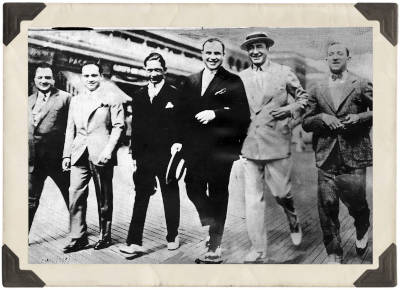
Under him, the City became one of the leading ports for importing bootleg alcohol, and in 1927, Johnson agreed to join a loose organisation of other bootleggers along the East Coast, forming the Big Seven or Seven Group.
Johnson also hosted the Atlantic City Conference in 1929, four years before prohibition came to an end. The conference was a meeting of national organised crime leaders including Al Capone, who was photographed walking down the boardwalk.
Johnson’s Arrest
However, Johnson’s downfall came during the 1930s following the end of prohibition. Johnson’s name appeared several times in articles published by the New York Evening Journal about Atlantic City’s problems with prostitution, gambling and alcohol.
Johnson began facing scrutiny from the federal government and in 1939, Johnson was indicted for income tax evasion. He was sentenced to ten years in prison along with a fine of $20,000. He served four of his ten years before he was paroled and avoided the fine.
For the rest of his life, Johnson lived in peace before dying in his sleep at the age of 85 in 1968 at the Atlantic County Convalescent Home. However, his reputation lived on and his life was fictionalised in HBO’s acclaimed Boardwalk Empire television series.
The End of Atlantic City’s Golden Age
Atlantic City faced a decline after President Franklin D Roosevelt repealed prohibition in 1933. Following the Second World War, the small city became plagued with poverty and crime due to a decrease in the number of tourists. This was because cars had become readily available for many Americans after the war, allowing them to travel further across the state instead of using trains.
When Atlantic City was first founded, it relied heavily on Americans using trains to visit the city, but since they had cars, many were choosing to go elsewhere. Also, many families around this time chose to move into their own private homes in the suburbs with luxuries such as air conditioning and swimming pools. This diminished their interest in travelling to beach resorts for the summer and those who were interested could grab cheap tickets to resorts in Miami or the Bahamas.
By the late 1960s, many hotels in Atlantic City were suffering economically and either shut down or were converted to cheap apartments or nursing home facilities. Before the legalisation of gambling in 1976, many of Atlantic City’s original hotels were demolished. Only the Claridge, the Dennis, the Ritz-Carlton and the Haddon Hall hotels survived.
Atlantic City continued its decline until 1976 when gambling was finally made legal and the first casino officially opened.
America’s Second Gambling State
Between 1894 and 1939, all gambling was outlawed in New Jersey. However, the recent decline of Atlantic City forced the state’s officials to reconsider their stance on gambling. They attempted to revitalise the city by introducing gambling but New Jersey residents voted against its legalisation in 1974.
Two years later, however, residents passed a referendum that legalised casino gambling and restricted it to Atlantic City. At the time, Nevada was the only US state that allowed casino gambling.
As soon as the referendum had passed, the owners of the Chalfonte-Haddon Hall Hotel began converting the property into the Resorts International Casino, known today as the Resorts Casino Hotel. Much of the Resorts International building was remodelled to introduce a casino, showroom, restaurants and shops and it became the first legal casino on the East Coast.
Back then, New Jersey’s gambling laws only allowed casinos to operate for 18 hours during the week and 20 over the weekend. Resorts International Casino opened its doors at 10 AM on May 26, 1978, and hundreds of people queued up to enter the building. According to reports, the resort’s first acts were Eydie Gorme Steve Lawrence, who was also the first person to throw dice at one of the casino’s craps tables.
The late 1970s and early 1980s saw a boom in the number of casinos opening in Atlantic City. Caesar’s and Bally’s casinos opened in 1979 while The Brighton, Harrah’s and the Golden Nugget casinos opened in 1980. More casinos followed and with them, tourists. As the popularity of Atlantic City began to grow, Donald Trump saw a business opportunity.
Trump’s Atlantic City
Trump Plaza
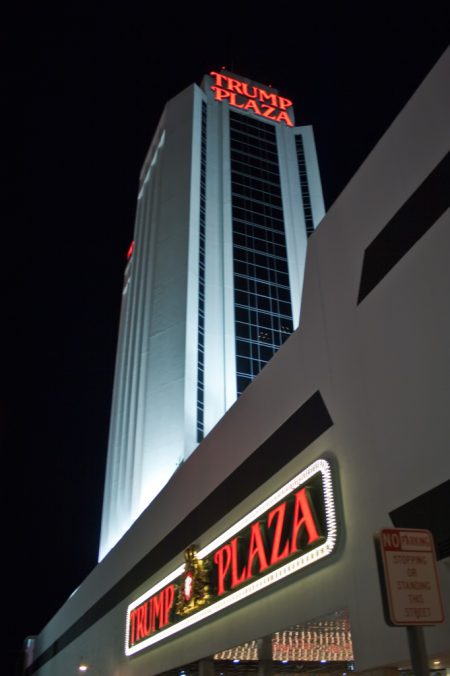
Before becoming president in 2016, Donald Trump was an infamous real-estate developer and became the owner of several casinos in the city. It started in the early 1980s when Trump began purchasing properties along the Atlantic City boardwalk and obtained a casino gambling license from the New Jersey Casino Control Commission (CCC).
Then, in 1982, the Trump Organisation, owned by Donald, started construction on a casino. Harrah’s, the gaming unit of Holiday Inns, joined the project as a partner in July. Under their agreement, Trump would oversee construction while Harrah’s would operate the casino.
It opened on May 14, 1984, under the name Harrah’s at Trump Plaza. It contained over 600 hotel rooms, seven restaurants, a health club, a 750-seat showroom and a 60,000 square foot casino. Five months after opening, the casino was renamed to Trump’s Plaza to avoid confusion with Harrah’s existing casino, Harrah’s Marina.
The casino performed poorly because Harrah’s attracted low-rolling gamblers and Trump had constructed 85 high-roller suites. The poor revenue led to disagreements between Trump and Harrah’s, leading Trump to buy out Harrah’s interest in the property for $70 million in 1986.
Around the same time, Trump purchased the neighbouring and unfinished Penthouse Boardwalk Hotel and Casino for $62 million with plans on extending Trump Plaza onto the Penthouse Boardwalk site. He also purchased the bankrupt Atlantis Casino Hotel for $63 million. The property was separated from Trump Plaza by the Atlantic City Convention Hall but was renamed to the Trump Regency, a hotel annexe beside the plaza. The property was renamed to the Trump World’s Fair at Trump Plaza Hotel and Casino in 1996 but was closed in October 1999 and torn down in 2000.
Meanwhile, Trump Plaza hit headlines over an infamous baccarat session in which Japanese high-roller Akio Kashiwagi lost $10 million, an incident fictionalised in Casino.
By the early 1990s, Trump Plaza had begun to decline due to fierce competition from the recently opened Trump Taj Mahal casino. Later on, in 1995, Trump sold the property to Trump Hotels & Casino Resorts (Which would later become Trump Entertainment Resorts), also owned by Trump.
Several expansions opened at the casino throughout the late 1990s. Then, in 2011, Trump Entertainment Resorts announced that it would either sell the casino or renovate and expand it. Two years later, in February 2013, Trump began negotiations to sell the property to Meruelo Group, but talks failed.
On July 12, 2014, it was announced that the Trump Plaza Hotel and Casino would close in September 2014 if a buyer wasn’t found, putting around 1,000 employees out of work. In August of the same year, Trump filed a lawsuit requesting for his name to be removed from the property because it had “fallen into disrepair”. The casino closed for good in September 2014 and is expected to be demolished.
Trump Castle & Marina
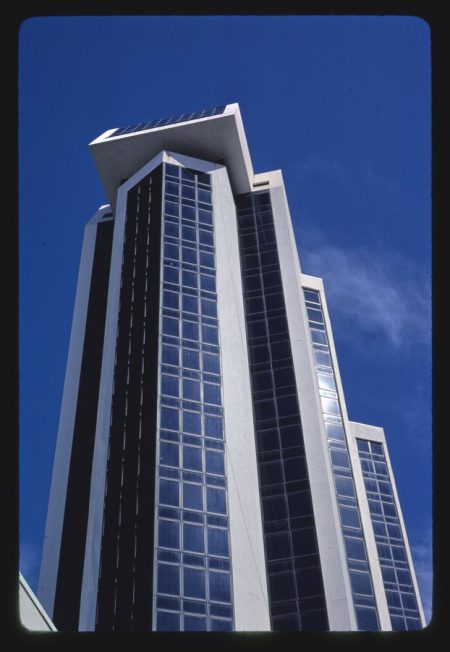
Trump Castle was originally built by Hilton Hotels. Trump bought out the property in the mid-1980s when Hilton Hotels were denied a gambling license from the New Jersey Casino Control Commission (CCC). After the opening of the Trump Taj Mahal in 1990, revenue at Trump Castle took a hit. When the casino was unable to make a payment of $338 million in bonds, the property fell into massive debt.
Hilton offered to repurchase the property, but Trump rejected the offer. A deal was later reached, giving bondholders 50% ownership of the property.
Then, in 1996, Trump sold the casino to his new publicly traded company Trump Hotels & Casino Resorts (THCR) for $130 million in stock plus $355 million in assumed debt.
Following this, Trump began negotiations to sell a 50% stake in the property to the Rank Organisation to convert it into a Hard Rock Hotel and Casino. The plans failed, and Trump Castle was renamed to Trump Marina in 1997. The property was almost sold for $316 million to Coastal Development before the casino was overtaken by bondholders and sold to Landry’s, Inc. who converted it into the Golden Nugget Atlantic Casino.
Trump Taj Mahal
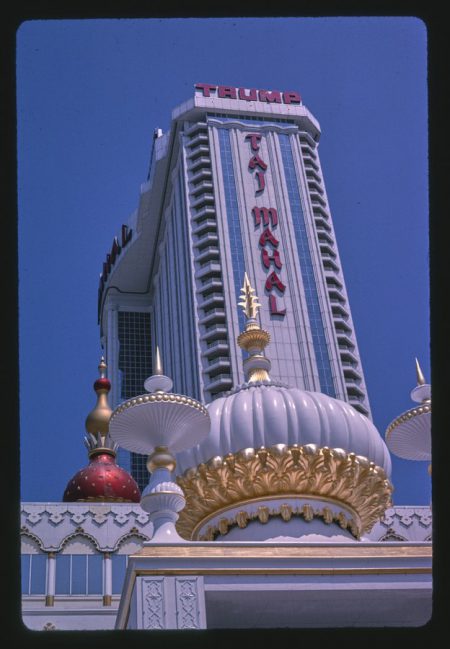
Resorts International began construction on what was originally called the Taj Mahal in 1983 with an estimated budget of $250 million. However, when Resorts International owner James Crosby died, Trump beat out several bidders to purchase a controlling stake in the company for $79 million. Following this, Trump, who at the time already owned two casinos, was appointed the chairman of the company and had plans to complete the Taj Mahal within the next year.
However, New Jersey prohibited anyone from owning more than three casinos prompting Trump to close the original Resorts casino. The budget for the project quickly ballooned to $930 million and Resorts International, which was close to bankruptcy at the time, struggled to find the additional $550 million to complete the project. So, in early 1988, Trump offered to buy all outstanding stocks for $22 a share.
At the same time, television producer Merv Griffin unexpectedly offered to pay $35 a share, sparking a legal battle between the two men. They eventually reached a settlement in which Griffin purchased the company but sold the Taj Mahal property to Trump for $273 million. Trump was then able to raise the $675 million required to finish the project though junk bonds with a 14% interest rate. The casino opened on April 2, 1990, and was reportedly the biggest casino in the world.
Shortly after its opening, the Trump Taj Mahal became the highest grossing casino in Atlantic City until the Borgata opened in 2003. It was also home to America’s first casino strip club. However, it faced several controversies. The casino was linked to organised crime, was accused of money laundering and several deadly shootings took place at the casino.
On May 27, 2009, casino shift manager Ray Kot was shot and killed by Mark Magee, 57, from Pennsylvania. On September 18, 2011, Sunil Rattu, 28, and Radha Ghetia, 24, were held up as they left the casino and forced to drive to a nearby alley where Rattu was shot dead and Ghetia wounded. Then, on March 24, 2016, three teenagers attending a party in a hotel room on the twenty-fourth floor were shot and seven suspects were arrested in connection with the attack.
Within eighteen months of its opening, however, the casino was on the verge of bankruptcy as construction contractors claimed they were still owed millions. The property filed for Chapter 11 bankruptcy and Trump was forced to sell several personal assets including his airline Trump Shuttle and his megayacht Trump Princess. He also lost half of his interest in the property to bond owners. Then, in 1995, the casino was sold to Trump Hotels & Casino Resorts (THCR).
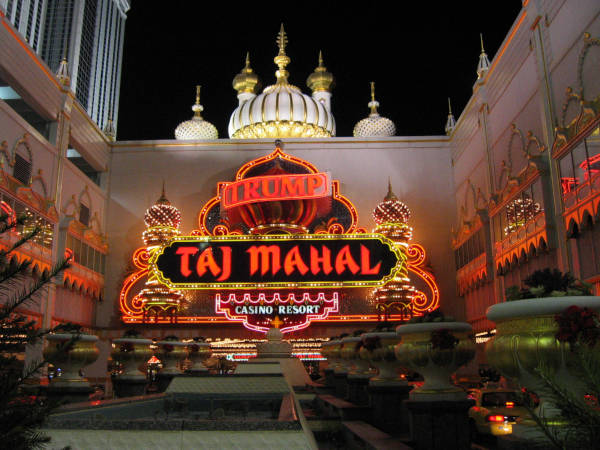
THCR filed for Chapter 11 bankruptcy in 2004 and the name of the company was changed to Trump Entertainment Resorts. Five years later, Trump Entertainment Resorts filed for bankruptcy and Trump resigned as chairman but retained 10% of the company. Although the casino remained open under new owner Carl Icahn, it closed completely in October 2016.
While Donald Trump filed for bankruptcy for all of his casinos, he was responsible for sparking an increased interest in casino gambling during the late 1990s and early 2000s. During his short reign, he brought big name boxers to Atlantic City to attract customers, including Mike Tyson who fought most of his matches in the city. The increased interest in casino gambling eventually led to the opening of the Borgata Casino in 2003, which completely changed Atlantic City.
Atlantic City Casinos in 2020
MGM Resorts International later opened the Las Vegas-styled Borgata Hotel Casino & Spa in 2003. It was unique from the other casinos available in the city as it opened with 200 table games and a 34-table poker room. It also promoted a nightlife scene and was home to several restaurants which the city had never seen before. The popularity around poker was higher than ever at this time following amateur player Chris Moneymaker’s win of the 2003 World Series of Poker Main Event.
In 2005, Borgata’s revenue increased to just under $700 million, becoming the highest grossing casino in Atlantic City. Two year’s later, however, casino revenue began to tumble and continued to fall through the next decade. By 2014, one-third of Atlantic City’s boardwalk casinos had been shut down.
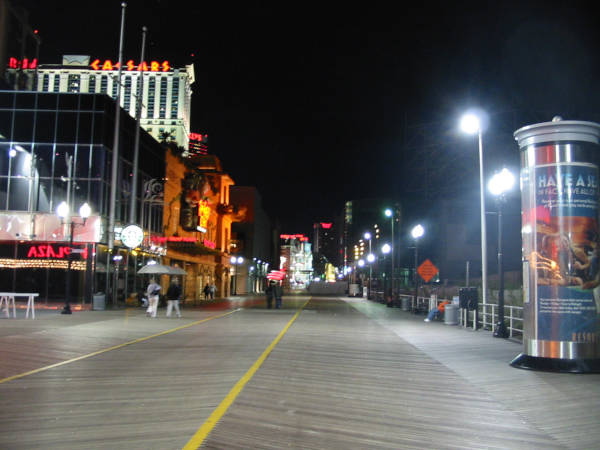
In December 2012, New Jersey passed a law that legalised online gambling, prompting Borgata Hotel Casino & Spa, Caesars Atlantic City, Golden Nugget Hotel Casino, Resorts Casino Hotel and the Tropicana Casino and Resort to launch their online gambling services.
Slowly, both online and real-life casino gambling revenue increased and 2018 saw two new Atlantic City casinos open their doors for the first time in six years. The Seminole Tribe of Florida purchased the abandoned Trump Taj Mahal space and relaunched it under their Hard Rock brand.
The casino is now known as the Hard Rock Hotel & Casino Atlantic City. Bruce Deifik also opened the Ocean Resort Casino under the resurrected Revel brand.
Now, following the Supreme Court’s decision to overturn the federal ban on sports betting, several online and real-life casinos have launched sports betting services. At the time of writing, there are six real-life sportsbook venues located in Atlantic City and New Jersey residents can access eight online sportsbooks, six of which are partnered with Atlantic City casinos.
The launch of sportsbooks is expected to rejuvenate Atlantic City and could help establish new real-life casinos in the city, paving the way for more visitors. Who knows, Atlantic City may once again become the popular tourist spot it was during its golden age.





